It’s been 18 months since I acquired my Yamaha FG850 Acoustic Guitar and put together a video review. In this in-depth review, I’ll look at the guitar in much greater detail.
Now that I’ve got a good bit of experience with the guitar, a few notable good and bad points have emerged, which I’ll use to structure this Yamaha FG850 acoustic guitar review. I’ll also compare the Yamaha FG850 with its predecessor, the (sort of) similarly priced and specced Taylor 110e.
*Note Although the two guitars are both dreadnought-size acoustics, the new version of the Taylor 110e now retails at almost twice the price of the sub-£400 Yamaha, is US-built, has upgraded inbuilt electronics, and most importantly, a solid spruce top vs the solid mahogany of the Yamaha.
Yamaha FG850 Acoustic Guitar: The Bad
Yamaha dimensions and feel
There’s no getting away from it. Yamaha guitars have a certain downsized feel to them, which is the result of a narrower nut width, flatter fingerboard radius and skinnier frets than a lot of other brands. For me, it’s a little more cramped than usual and takes some getting used to. Purely a personal preference thing, but I would have preferred more space, a wider nut width, a deeper radius and larger frets. In fairness, I can’t really blame or fault Yamaha for the design decisions they’ve stuck with for years.
The very light build
The Yamaha FG850 is not only a very light guitar, it doesn’t seem to be very solid or durable either. When it’s out of its case (or padded gig bag in my case), you should always be wary of dings and knocks, but in this case, I feel even the slightest contact results in some sort of blemish. My old Taylor 110e seemed much more solid. Some might say this style of delicate build (featuring scalloped bracing no less) promotes tone, but for me it’s the only facet of the Yamaha that feels, dare I say it, cheap?
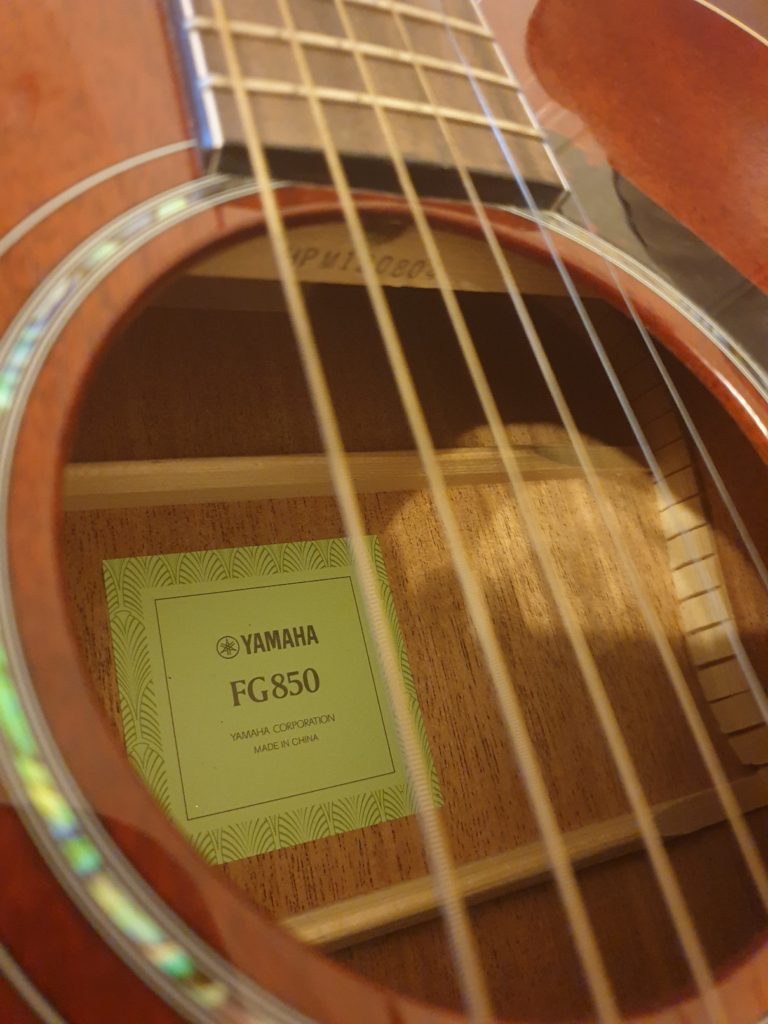
No case
… and to add insult to injury, the Yamaha FG850 ships with no case, unlike the Taylor which came with a fantastic Taylor-branded padded gig-bag. For £370 it should of at least included a gig-bag.
Minimal setup work
The action was sky-high when it arrived, and even after a saddle-sanding and truss-rod tweak I always get the feeling that the Yamaha should have had more attention in this area before it arrived. By contrast, the Taylor was pretty much perfect out of the box, close enough that I never needed or wanted to tweak it anyway.
As with the dimensions point, this is probably not the fault of Yamaha, so I’m going to qualify it with the fact that the Yamaha FG850 was purchased online and arrived in a box, probably unopened since it left the factory in China. How could it have received the same level of setup as the Taylor, which was purchase at a guitar store?
No matter the excuses, The Yamaha FG850 doesn’t make a good first impression.
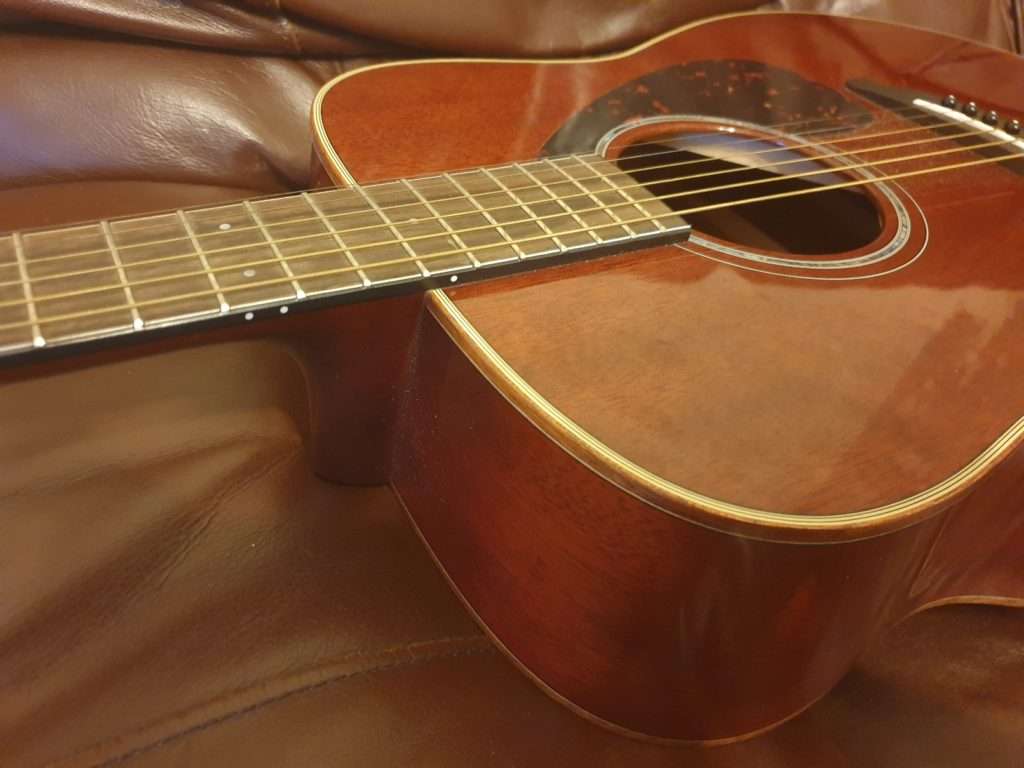
It makes me want to upgrade
The Yamaha FG850 is top of the FG (Green label) line and is the only acoustic guitar I’ve ever owned that is tempting me to upgrade to something very similar in the Yamaha Red Label series or into the core US Gibson, Martin or Taylor lines. That’s both a good and bad thing: Good because this budget/mid-level Yamaha instrument has inspired me to progress, and bad, because of exactly the same reason!
Value for money
As previously stated, the Taylor 110e now retails at just under £700 vs just under £400 for the Yamaha FG850. That makes the Yamaha a better deal surely? Well, when you consider that Taylor is a major US brand, with the 110e residing in its core line and the included Taylor padded gig-bag coming in at over £100, you begin question the Yamaha’s price-tag.
Why?
- All the points I’ve previously made
- Chinese made
- Resides in Yamaha’s budget, Green Label range, featuring the superbly priced solid spruce-topped FG800 at around £200 (Now that is what you call great value for money)
- Own brand tuners
- Nato neck
- Synthetic material (urea) for the nut and saddle
So, yeah, in the cold light of day, the Yamaha FG850 reveals itself to be on the expensive side for what it is. The components just don’t add up the the price point. Here’s the full spec:
Body Shape Traditional Western (Dreadnought).
Scale Length 650mm (25 9/16″)
Body Length 505mm (19 7/8″)
Total Length 1038mm (40 7/8″)
Body Width 412mm (16 1/4″)
Body Depth 100-118mm (3 15/16″- 4 5/8″)
Nut Width 43mm (1 11/16″)
String Spacing 11.0mm
Top Material Solid Mahogany
Back Material Mahogany
Side Material Mahogany
Neck Material Nato
Fingerboard Material Rosewood
Fingerboard Radius R400mm (23 5/8″)
Bridge Material Rosewood
Nut Material Urea
Saddle Material Urea
Bridge Pins Black ABS with White Dot
Tuners Die-cast Chrome(TM29T)
Body Binding Mahogany + Cream
Soundhole Inlay Abalone w/ Black + White
Pickguard Tortoise Pattern
Body Finish Gloss
Neck Finish Matt
Electronics None
Controls None
Connections None
Strings .012/.016/.025(or.024)/.032/.042/.052(or.053)
Colour Natural
Accessories Hex Wrench
Case None
It’s not as good as my old Taylor 110e.
When I weight it all up, My old Taylor 110e (full review here) was the better guitar. US made, stronger build, no out-of-the-box playability issues, and, looking back, despite it being a less inspiring instrument, it was the better tool, so perhaps it wasn’t the guitar’s fault. Looking back through some old videos for comparison, The Yamaha FG850 sounds more mid-focussed and perhaps a little louder (probably down to the mahogany construction), but the Taylor had a wider, woodier, more natural sound spectrum, and surprisingly, more bass response.
Not the best comparison, given the 10-year age gap of the Taylor vs the Yamaha, but there you go. Perhaps the Yamaha will mellow in time.

Yamaha FG850 vs Taylor 110e comparison
Here’s a couple of handy videos which demonstrate the differences between the two guitars in action. Visit Harson Robkus for much more.
First, the Taylor, notice the wider, more natural frequency response and the fuller bass?
And now the Yamaha, much more of that mid/high-mid bark don’t you think?
Yamaha FG850 Acoustic Guitar: The Good
Attention to detail and looks
The Yamaha has some gorgeous detailing in the abalone sound-hole surround and the headstock logo. The build is very clean and precise, with the white binding framing not only the show-stopping red-mahogany body and the fretboard, but also the (very pretty indeed) headstock, and bordered beautifully in contrasting black.
The frustrations I had with the Taylor, the painted on ebony saddle, the bodged pickup output jack, and the altogether vanilla experience are all a distant memory with the Yamaha. The Taylor was plain and workmanlike. The Yamaha has not a small amount of luxury and love applied to it.
But more than that, the Yamaha FG850 is beautiful, different and definitely not boring.
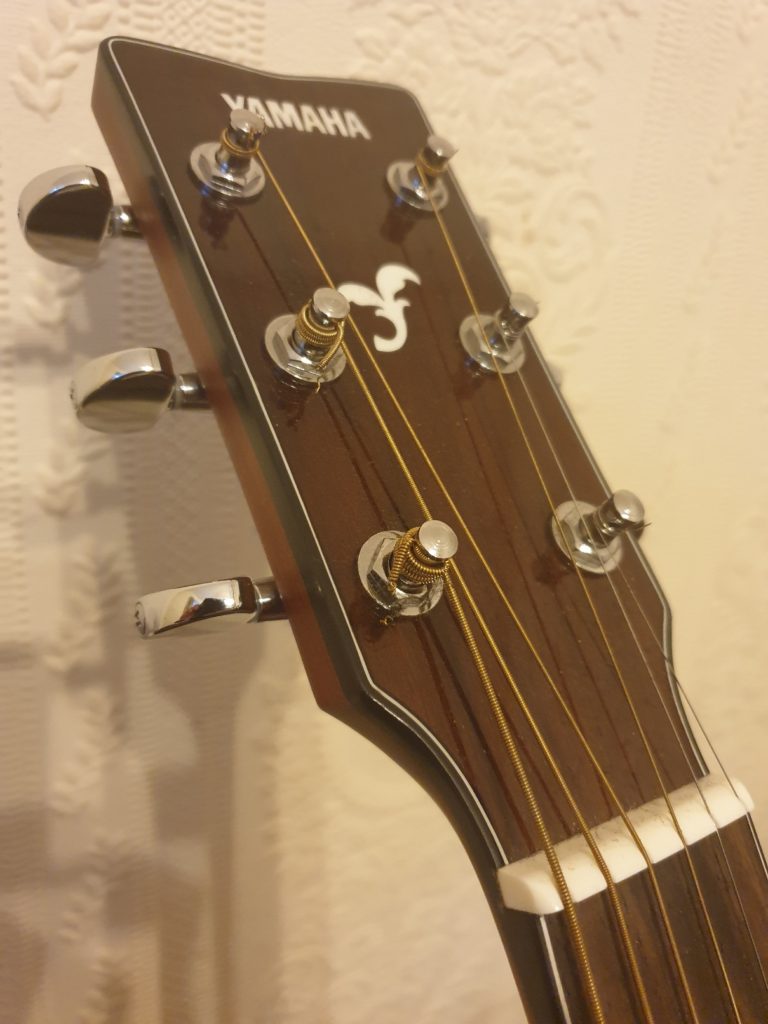
Tuners and tuning stability
The Yamaha FG850 features rock-solid Grover Rotomatic-esque tuners and has zero tuning issues whatsoever. Couldn’t really wish for more in this area. End of story.
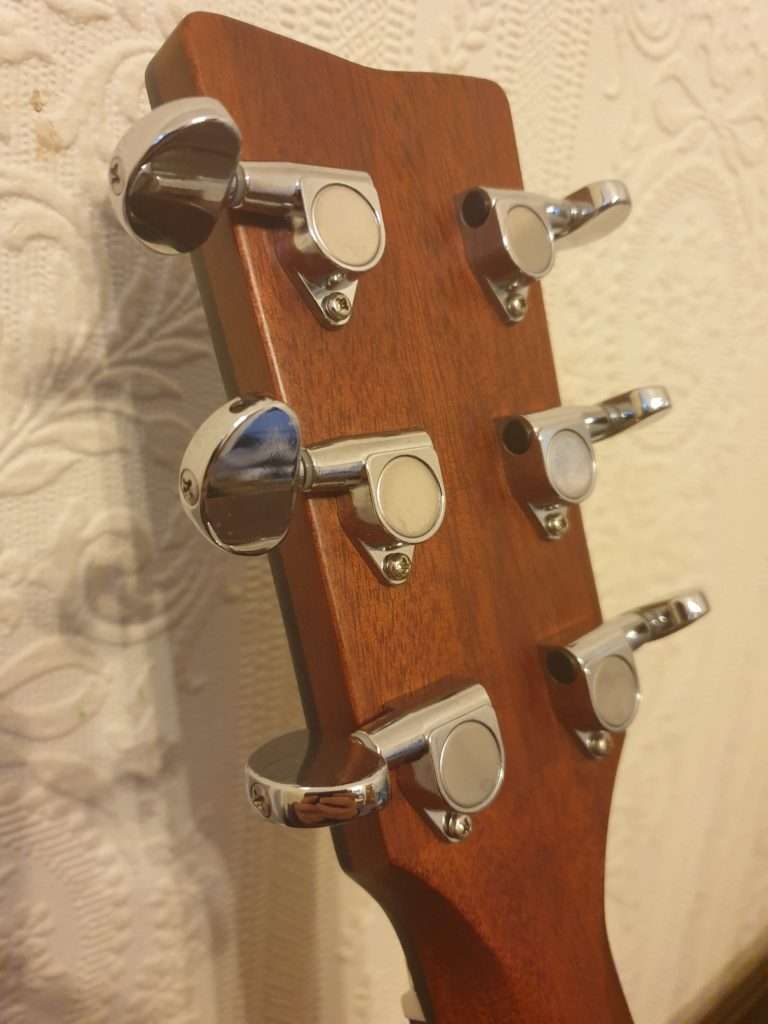
Tone and volume
My reason for purchasing the Yamaha FG850 was two-fold: a) Financial circumstance meant I needed to offload my Taylor, so I needed another acoustic guitar. b) The Taylor, to my ears, had always been treble-heavy, so with my high(ish) voice, I figured a richer sounding, mahogany-bodied acoustic would be in order. It didn’t disappoint!
The Yamaha FG850 is a very warm sounding instrument, devoid of the shrillness of the Taylor. At the moment, it’s new, so that mid-bark is quite prominent and the projection results in a higher-perceived volume which has actually presented a problem in that, for the first time, it’s been mentioned that I’m not singing loud enough!
Yes, it lacks the subtlety of the Taylor, for the moment, but maybe that’ll come with age and maybe my ears are still attuned to frequencies of the more usual spruce top. I’m also going to throw my old Simon & Patrick Cedar topped SP6 into the mix for comparison. That was pleasingly woody-sounding but dull and muted compared to the zingy, almost chorus-tinged Taylor. The Yamaha FG850 fits nicely in the middle, having that rich poke in the lower-mids but with more clarity and also some of the brightness of the Taylor.
Tone is always subjective, but mainly the Yamaha FG850 sounds the way you would expect mahogany to sound. It has that depth but also the clarity and bark with perhaps a narrower, more focussed frequency range than a spruce-topped acoustic. Is that a good thing? Only your own ears can decide.
Here’s the Yamaha FG850 on one of my own songs, You can check out more of my music here.
It’s a Yamaha FG!
Yup, very shallow and meaningless, but nonetheless it feels good to own a guitar with the history and pedigree of the Yamaha FG range. Sure, it’s not quite in Gibson, Martin or Taylor territory for the kudos factor, but it’s certainly not too far short.
Playability (once setup)
Well, it took some work and a bit of experimentation, but the end result is the nicest playing acoustic guitar I’ve ever owned, including the Taylor. True, I never touched the Taylor with so much as an allen key, but after a setup the Yamaha just about nicks it.
You’re never going to get an acoustic guitar action as low as an electric, but I seem to have found a nice balance of tone, action and buzz out of the Yamaha FG850, so much so that it’s a job done and something I don’t think about anymore.
Intonation is spot-on and this guitar rewards your trips up the dusty end with quite a good deal of clarity, detail and sustain in the high register, before the frets run out of course!
The narrower string spacing does cramp things up a little with picked arpeggio-ed open chords but the pay-off is easier partial chords higher up the fretboard and nimbler runs across the lower strings.
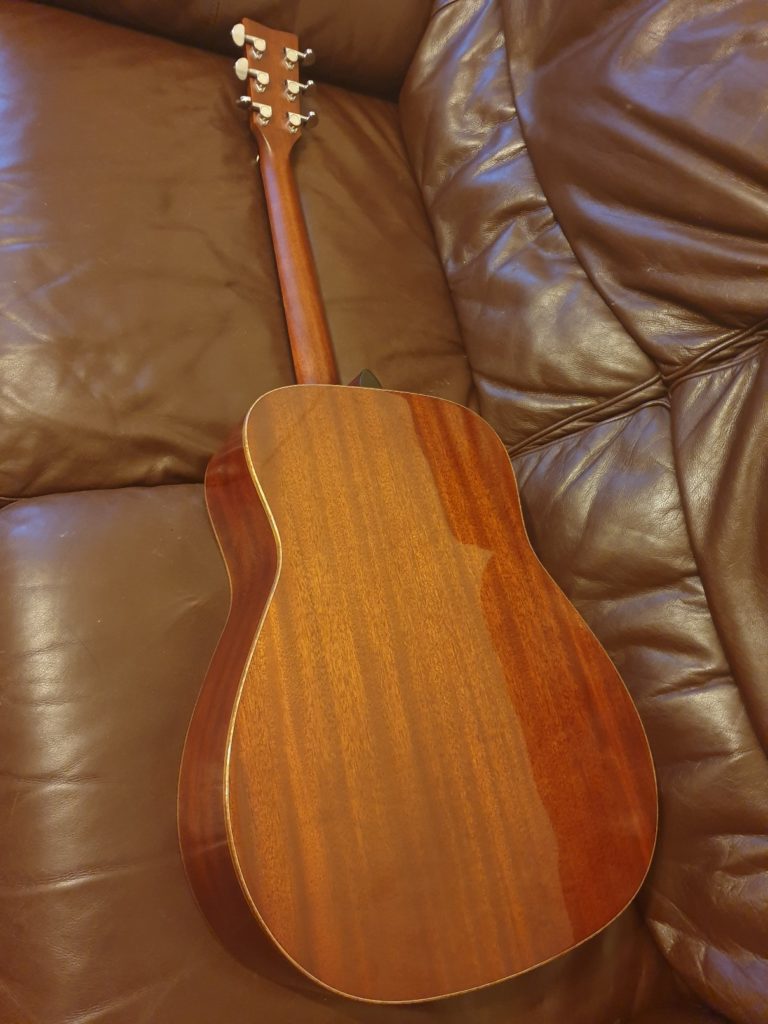
Inspiration
This is the big one, and if I’m being honest, the only one that matters.
For all its obvious assets, the Taylor 110e never really inspired me to pick it up to perform or write music. If a guitar can’t do that, it serves no purpose. Even when it wins a YouTube comparison test.
Inspiration is that indescribable, magical something that the Yamaha FG850 has in spades. Why? Because ever since I purchased it 18 months ago, all I’ve done is write songs on it, and writing songs is the number one job for any acoustic guitar, no-matter what the price-range.
So what’s so special about the Yamaha FG850? Well, with the Taylor, when you sit down to write songs and play a note or chord, it sounds the note or chord. Perfectly, predictably, and that’s hardly ever what you want. What you want is the guitar to respond to you, be unpredictable with its overtones and dynamics, surprise you into new ideas, lead you, delight you, inspire you, all with a single pick or strum… and that’s what the Yamaha has given me. It’s so much more than the sum of its parts.
The Yamaha FG850’s uncanny ability to gift you songs has manifested itself in recent practice/songwriting sessions where ideas have chained into others fairly seamlessly and in quick succession. Not bad for a budget/mid level guitar!
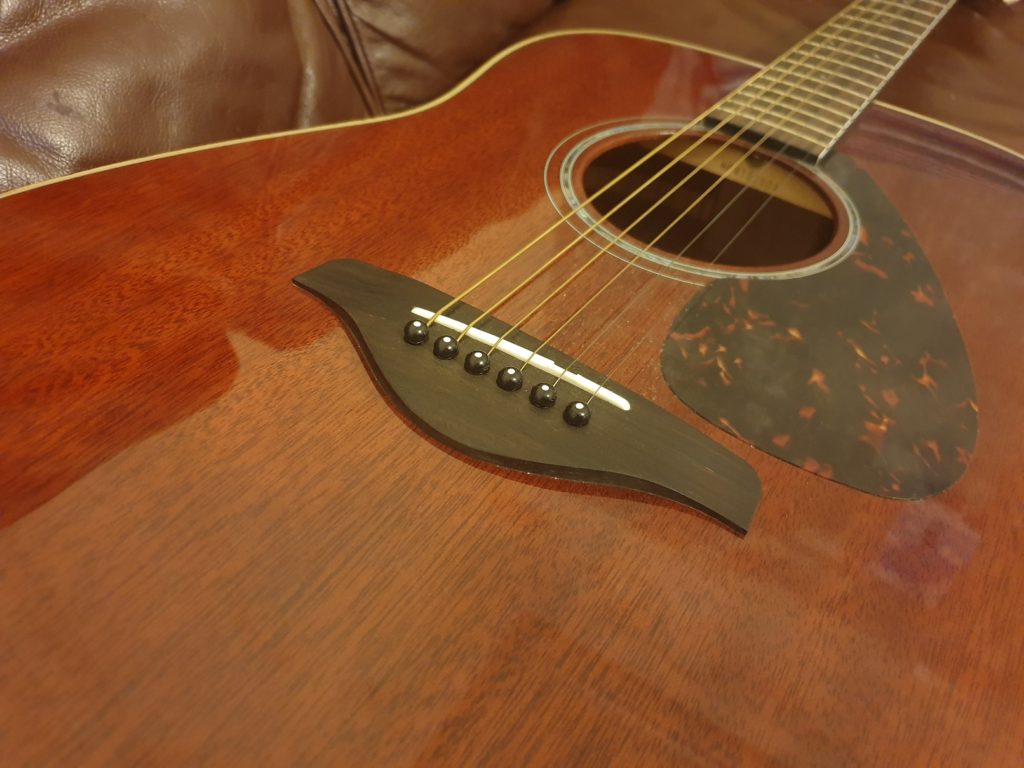
Check out my second option video from my YouTube channel here… and don’t forget to subscribe!
Conclusion
The year 2020 was a dark time with COVID, lockdowns and the end of live music for a time. One of the only highlights was the arrival of a work bonus, which paid for the guitar.
Since it arrived in my hands, I’ve started a YouTube channel, had the most productive songwriting period in 20 years, and relaunched the previously mentioned duo Harson Robkus onto a unsuspecting public!
And it’s all down to this guitar. A guitar I fell in love with, that helped me fall in love with music again, and, most of all, helped me through a tough year.
Sure, it doesn’t represent the ultimate in terms of value for money, setup, sturdiness, tone or pedigree, but it’s beautiful, lovingly constructed, and it excels in something that money can’t buy and that matters the most…
…the business of making music!
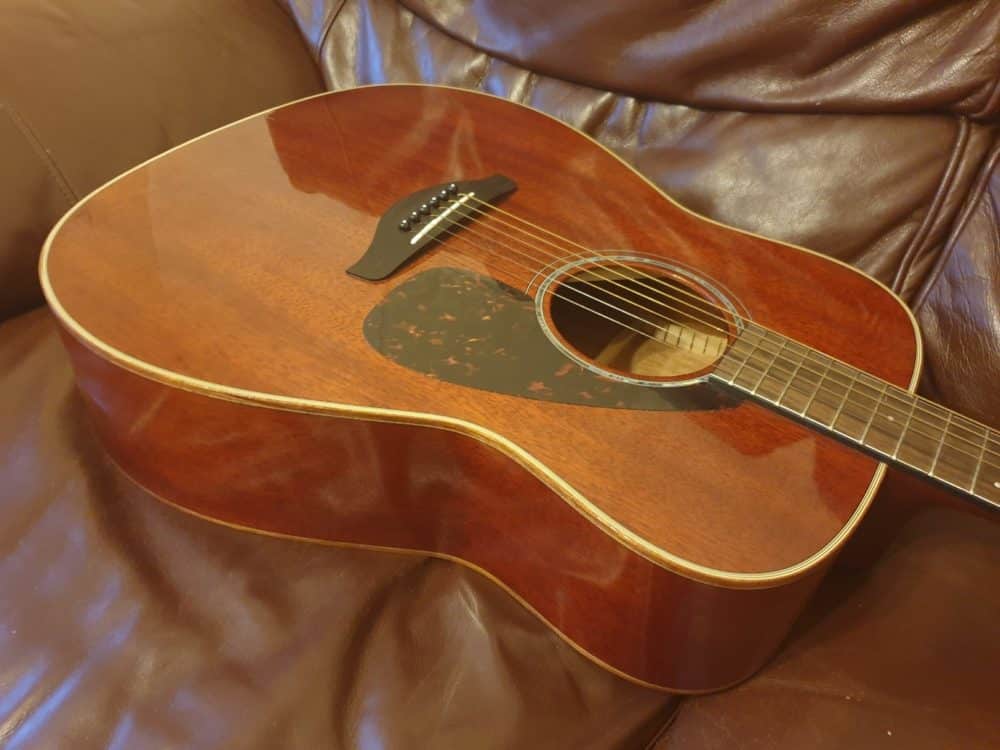
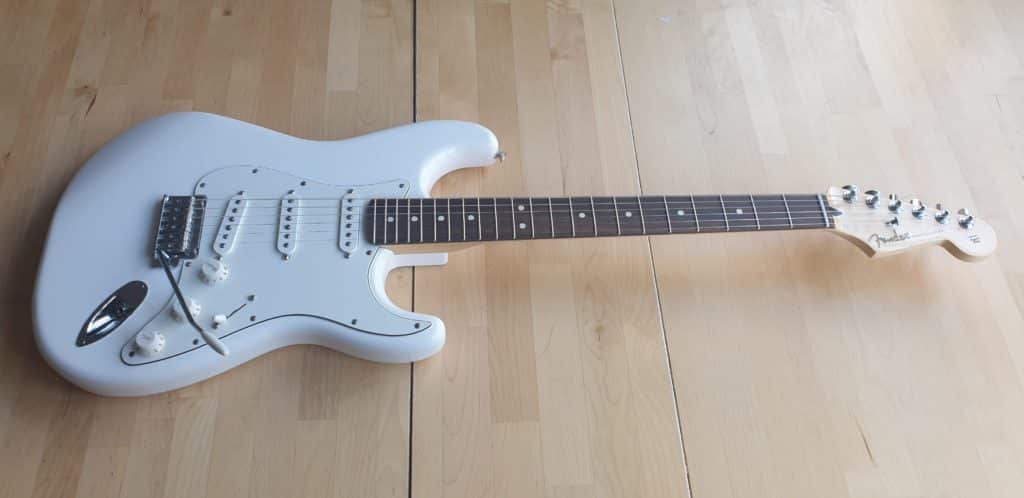

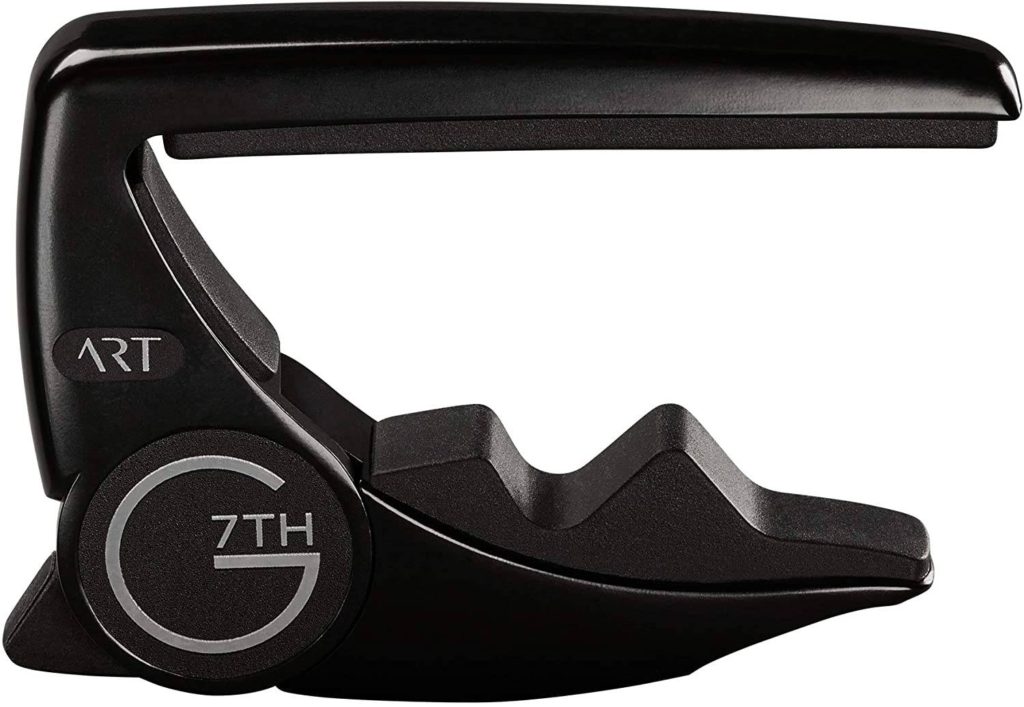
Thanks for the detailed review. It’s helped me make a purchase decision.
I did chuckle where, in one paragraph you cite US Manufacture as an advantage, and in almost the next paragraph you list a series of defects with your Taylor related to manufacturing / quality control issues.
Thanks Andy.
In fairness I’ll stand by the Taylor being the better built guitar. I don’t see the painted Bridge and the endpin being manufacture defects. I see them as sacrifices to get the Taylor to a price point.
The actual basics of the guitar…neck body, frets, etc…. all superior to the Yamaha, and overall a better feeling and sounding guitar.
I have owned several Martin and Taylor guitars . I bought a Yamaha fg 850 , hoping for the best . I was not disappointed . In fact ,I found the Yamaha a joy to play, way beyond my expectations . It resonates ,”MAGIC”. DO NOT HESITATE TO PURCHASE ONE OF THESE WONDERFUL MUSICAL INSTRUMENTS !
I had been looking for a full solid wood Spruce top guitar of some description last year, and played a bunch of solid back Yamahas in a guitar shop, Red label and A series. Played all of them None really grabbed me but along the way I did also pick up an FG850. It had something, the dark woody Mahogany, and the bright Yamaha-ness, and I thrashed around on it in Drop D for ten minutes, before going to the next store in search of what I had actually gone to look for. That something turned to to be an Eastman spruce/ovangkol model, and no regrets there, but I couldn’t get the FG850 out of my mind. I went online and dug around and found your blog post (even watched a bit of Harson Robkus…). Your point about the guitars quirks guiding your inspiration resonated, and convinced me to look for a 850 to complement the Eastman. A guy living two miles away was selling an FG850 for 170 pounds equivalent. Done ! And you were right. I’ve written about 20 songs on it in 8 months, more than on the Eastman. But in a twist of the tale it turns out there was another guy nearby selling a Martin D15m for a very good price, and my finances are in a better way than last year, so why not. No need for two mahogany dreadnoughts though… Time to sell my FG850 then… So I put some ads out and had a potential buyer lined up to come and try it out. I sat down to give it a farewell and maybe write one last song on it. I wrote three, in one hour… This guitar has magic powers. So the advert is offline again… Its going nowhere…
Hi Graeme.
Thank you so much, and glad it wasn’t just me thinking the 850 had a certain magic when it comes to songwriting. Its still true, if I want a song all i do is play this for an hour and II get at least something!
Thanks for checking out Harson Robkus. I also have my own Adam Harkus music category and YouTube channel.
From another Yamaha 850 fan. In fact I may just need to check out one of the new Revstar’s too. What do you think?